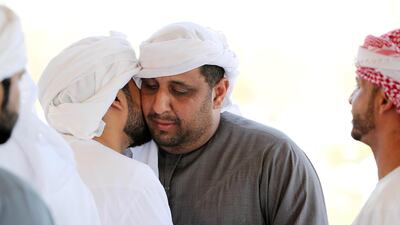It would take a heart of stone not to have been moved by the tragic deaths of seven siblings in a house fire. In one fell swoop, the Al Suraidi children were wiped out, with their heartbroken mother now contemplating a future of unimaginable grief and pain. Fire devastates lives and never more so than at 5.40am on Monday, when the four boys and three girls were overcome by toxic fumes after a blaze caused by an electrical fault broke out in the room next to where they were sleeping. All seven children, aged between five and 15, were buried the same day in Rul Dhadna, Fujairah, which has been left reeling by the tragedy.
It is hard to see how the community could ever see a way forward from such a calamity. Sheikh Mohammed bin Rashid, the Vice President and Ruler of Dubai, appeared to offer it with his online message: “Whatever harms the children of the UAE harms the entire nation.” He immediately announced plans to fit 60,000 villas owned by Emiratis with fire detection systems linking directly to Civil Defence control rooms, which will alert firefighters at the first sign of homes filling with the poisonous, odourless gas carbon monoxide. The move follows a number of blazes in Dubai, where skyscrapers such as Sulafa Tower and the Torch tower have repeatedly caught fire and the Address Downtown Dubai hotel burned down, sparking concerns about the type of flammable cladding used, which meant the fires tore rapidly through the buildings.
_______________
Read more:
Fire safety manual helps identify buildings at risk
Dubai steps up building evacuation drills to prepare residents for potential fires
Fire alarm system connected to Civil Defence to be fitted in residential homes
_______________
We have already seen from the horrific Grenfell Tower fire in London what impact that can have. It takes very little to start a fire but without the enforcement of the UAE's Fire and Life Safety Code, the effect can be devastating. In a country with a high rental market, it behoves landlords and commercial property owners to ensure their buildings are properly equipped with alarms and smoke detectors and undergo regular checks and third party independent inspections, as per the law. Landlords have a responsibility to protect the safety of those living within their walls, whatever the cost or inconvenience. Concerns remain about the cladding on building pre-dating the 2012 law, which phased out combustible cladding in new buildings. Sheikh Mohammed's gesture is the first decisive step in instigating a culture of fire safety. It might be too late for Shouq, Khalifa, Ahmad, Ali, Sheikha, Sara and Summaya, but we could all do with being a little more aware as to how best to protect ourselves in an emergency.

